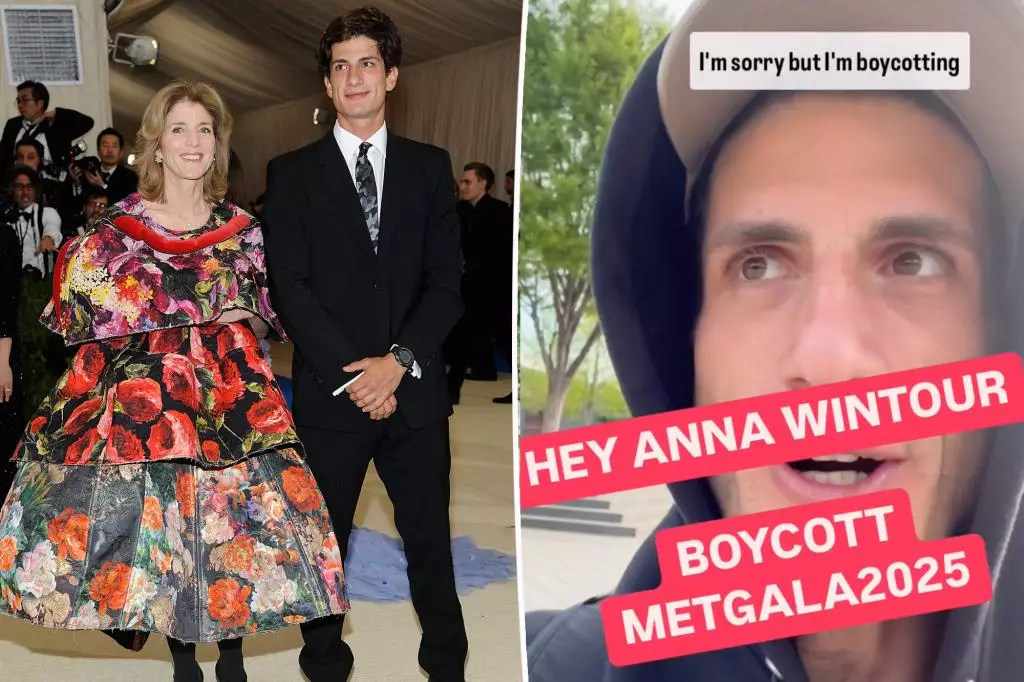In an unexpected yet invigorating move, Jack Schlossberg, the grandson of the iconic John F. Kennedy and son of Caroline Kennedy, has taken to social media to express his strong disdain for the upcoming Met Gala. In a series of passionately crafted posts, he has declared his intent to boycott the event known as the “Oscars of fashion.” This high-profile gala, which famously transcends mere fashion shows to become a cultural phenomenon, is set against this backdrop of Schlossberg’s vivacious disdain for what he perceives as an outdated and irrelevant celebration of frivolity amidst serious global issues.
While it might be easy for critics to dismiss von Schlossberg’s proclamations as mere attention-seeking—especially given reports that he did not receive an invitation to this year’s gala—it is essential to dive deeper into the implications of such a boycott. In a world where fashion is often viewed more as a status symbol than a tool for activism, Schlossberg’s perspective could signal a shift in the narrative surrounding high-fashion events. His assertion, “With so much happening at home and around the world, it’s not the time for a party like that,” resonates with a growing movement of individuals urging industries to prioritize social issues over spectacle.
An Inherent Contradiction
The irony, of course, lies in the reality that Schlossberg has not technically been invited to the Met Gala this year, nor has he been invited in previous years unless accompanied by family. His past attendance as his mother’s plus one underscores the insular nature of fashion’s most elite circles. The heart of the Met Gala’s exclusivity is rooted in designer sponsorships; those who attend are often handpicked because they represent brands seeking to increase visibility and lend celebrity credence to their artistic works. Thus, Schlossberg, an aspiring figure in journalism and media, is not traditionally aligned with the fashion-world hierarchy.
What truly complicates his rhetoric, however, is his relationship with Vogue. Previously working as a freelancer for the influential publication, Schlossberg’s current admonition towards them—where he criticizes their silence on pressing political issues—is a glaring contradiction. It begs the question: why now? Why use social media as a battleground against an institution that once showcased his work? It appears his current tactic may be less about the merits of fashion activism and more about establishing a brand identity that is loud and unapologetic.
Influencing the Fashion Dialogue
Schlossberg’s approach to using his platform to criticize high-fashion events for their perceived apathy towards societal issues raises a significant discussion about the role of media and influencers in contemporary society. His comments, such as “Vogue shouldn’t be so scared of my boycott,” challenge not only the fashion elite but extend to the broader landscape of media responsibility. In a time when social media can amplify voices that question corporate ethics and social responsibility, Schlossberg poses an essential inquiry to the fashion industry: Can these institutions stand up and take a stance on issues that impact our reality?
Through his audacious online presence and calls to action, Schlossberg seems determined to reshape conversations within the fashion community by leveraging his heritage and voice. By asserting his own news channel as an alternative outlet, he is positioning himself as a one-man initiative to bridge the gap between fashion and social justice—an ambitious endeavor that walks a fine line between advocacy and self-promotion.
A Star-studded Contrast
The lineup for the upcoming Met Gala stands in stark contrast to Schlossberg’s self-imposed boycott. Esteemed figures such as Shakira, Lizzo, and A$AP Rocky are set to grace the event, promising a night that accentuates glamour and artistry while reinforcing the traditional constructs of the fashion elite. Schlossberg’s position, nestled against such celebrated names, offers a pointed reminder of the divides within the industry; while some thrive in the spotlight, others attempt to forge their paths by speaking out against it.
Ultimately, Schlossberg’s actions catalyze an essential examination of how far fashion’s influence extends into the socio-political realm. Is it enough to simply attend soirées like the Met Gala, or should attendees—particularly those with significant followings and influence—engage in more substantial discussions about the responsibilities vested in such platforms? As the Met Gala approaches, Schlossberg’s boycott madly churns the waters, pushing us to reflect on America’s century-long love affair with fashion, celebrity, and responsibility.

